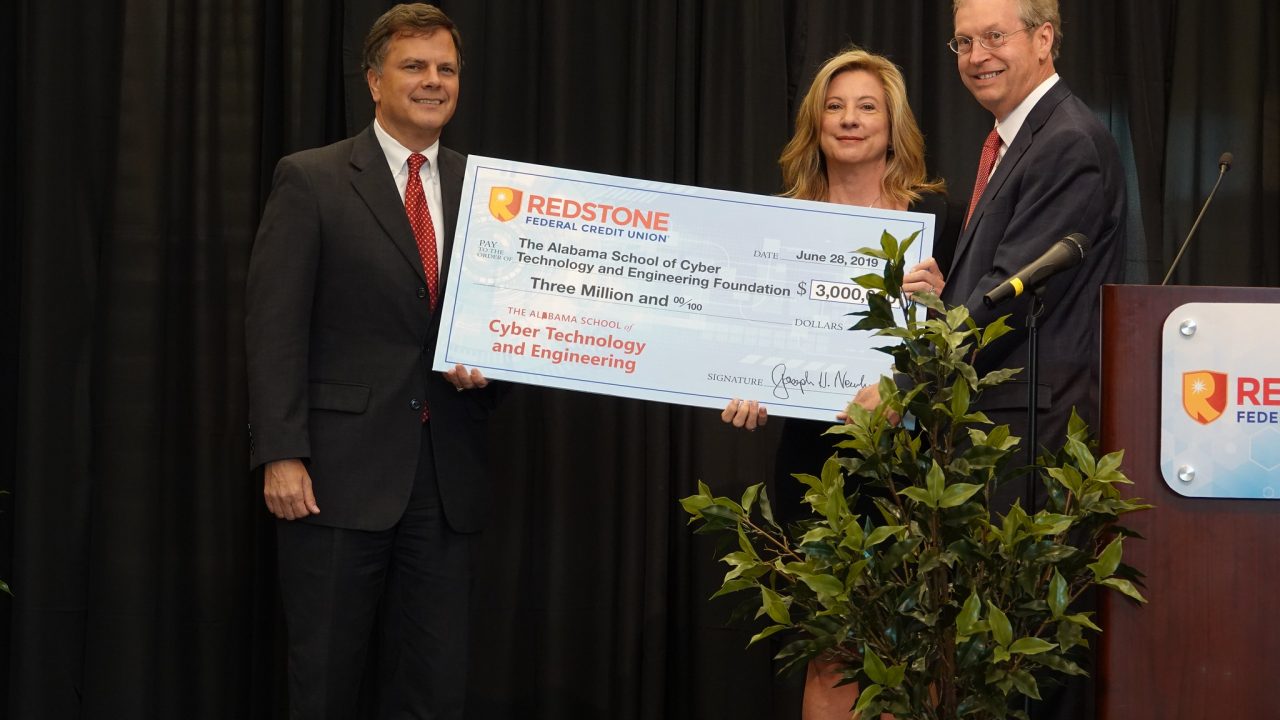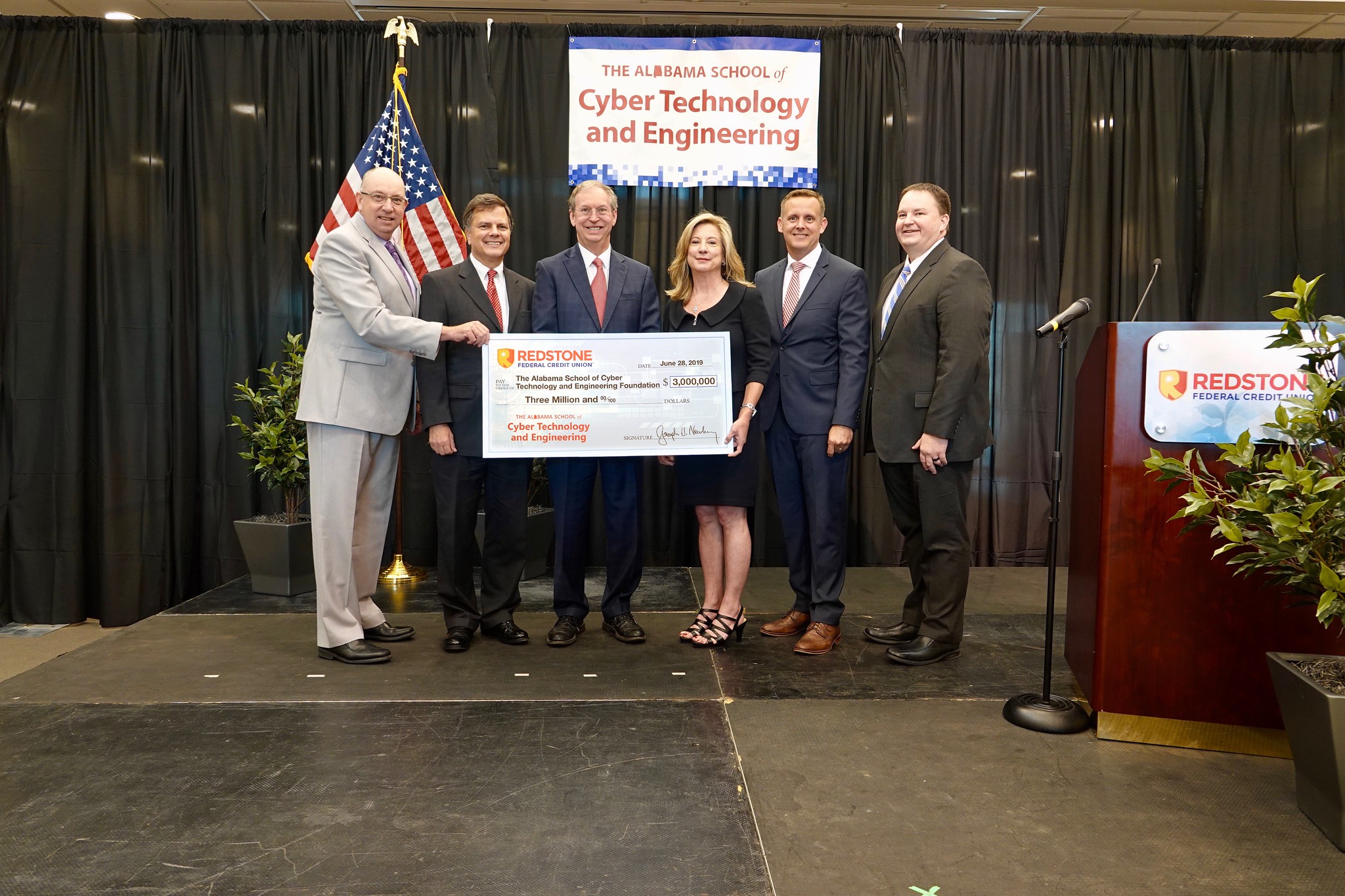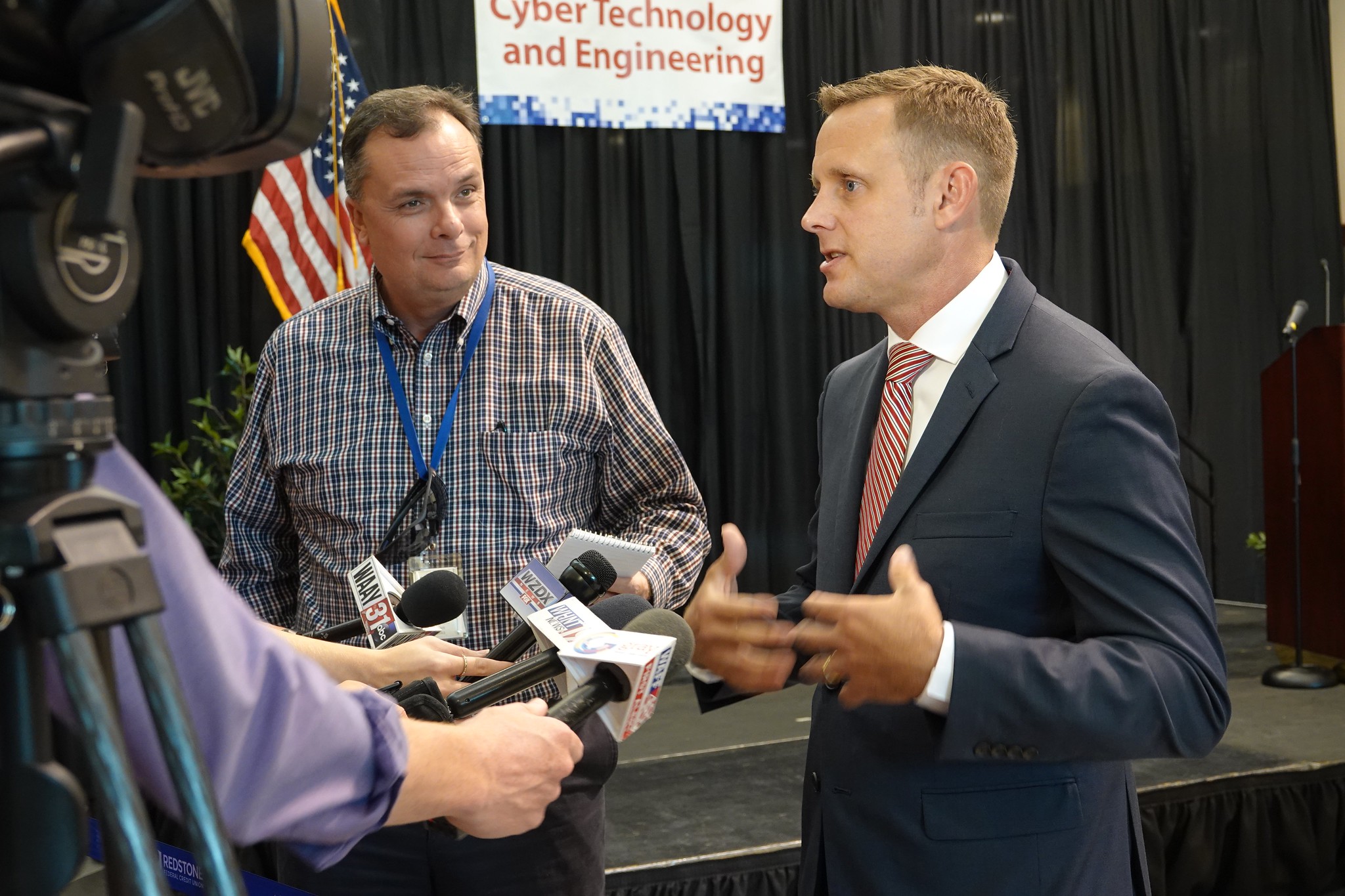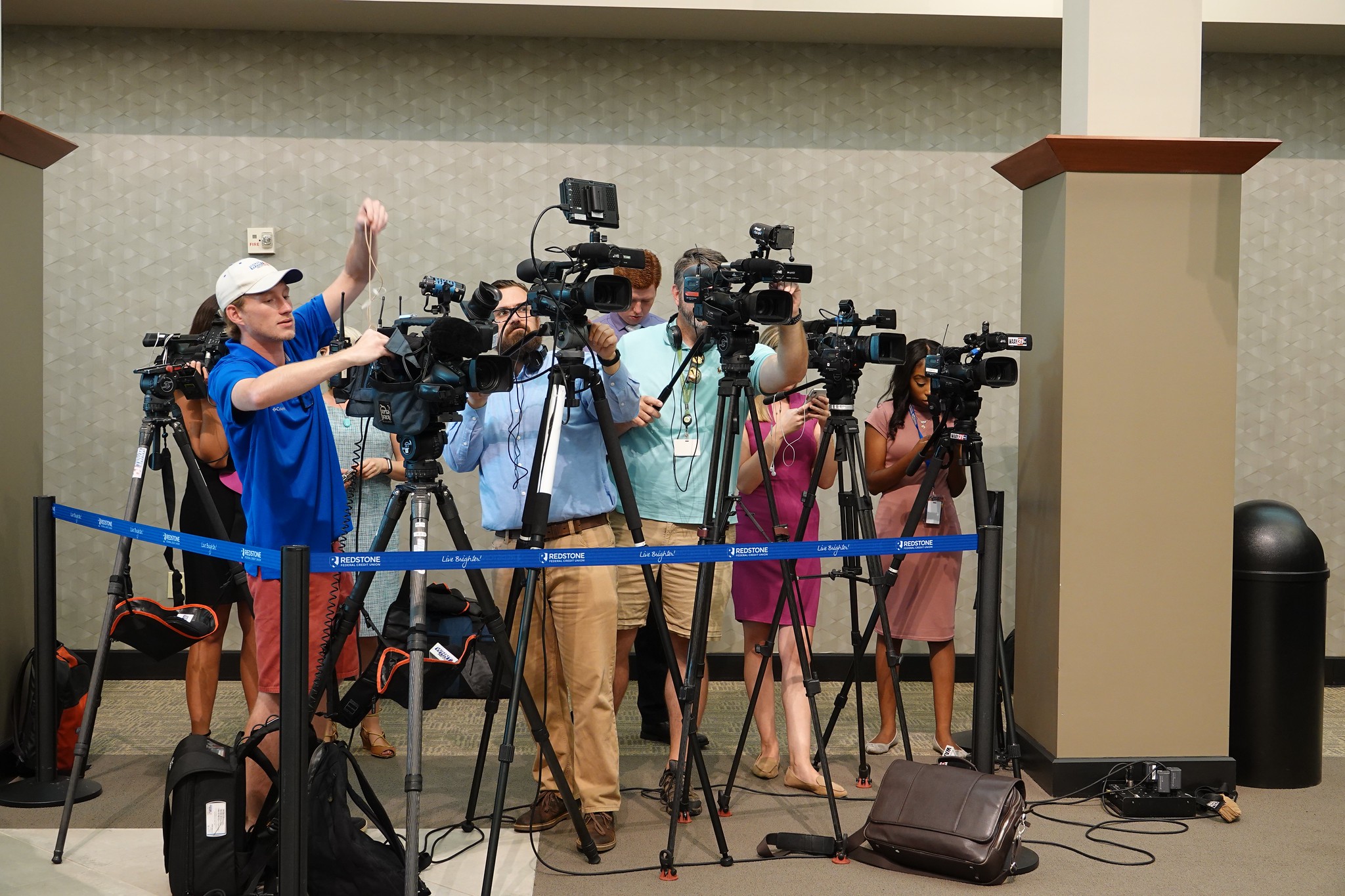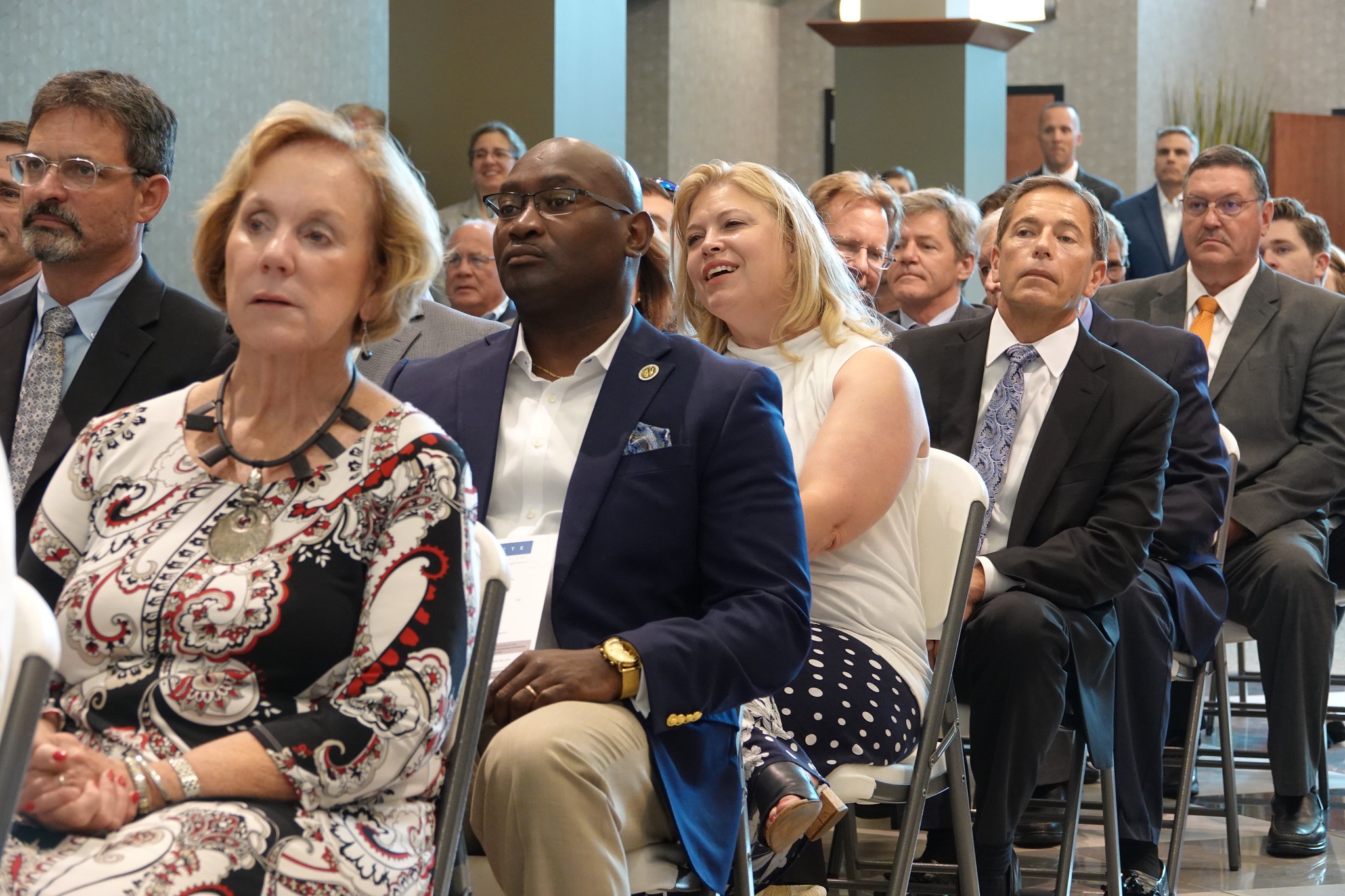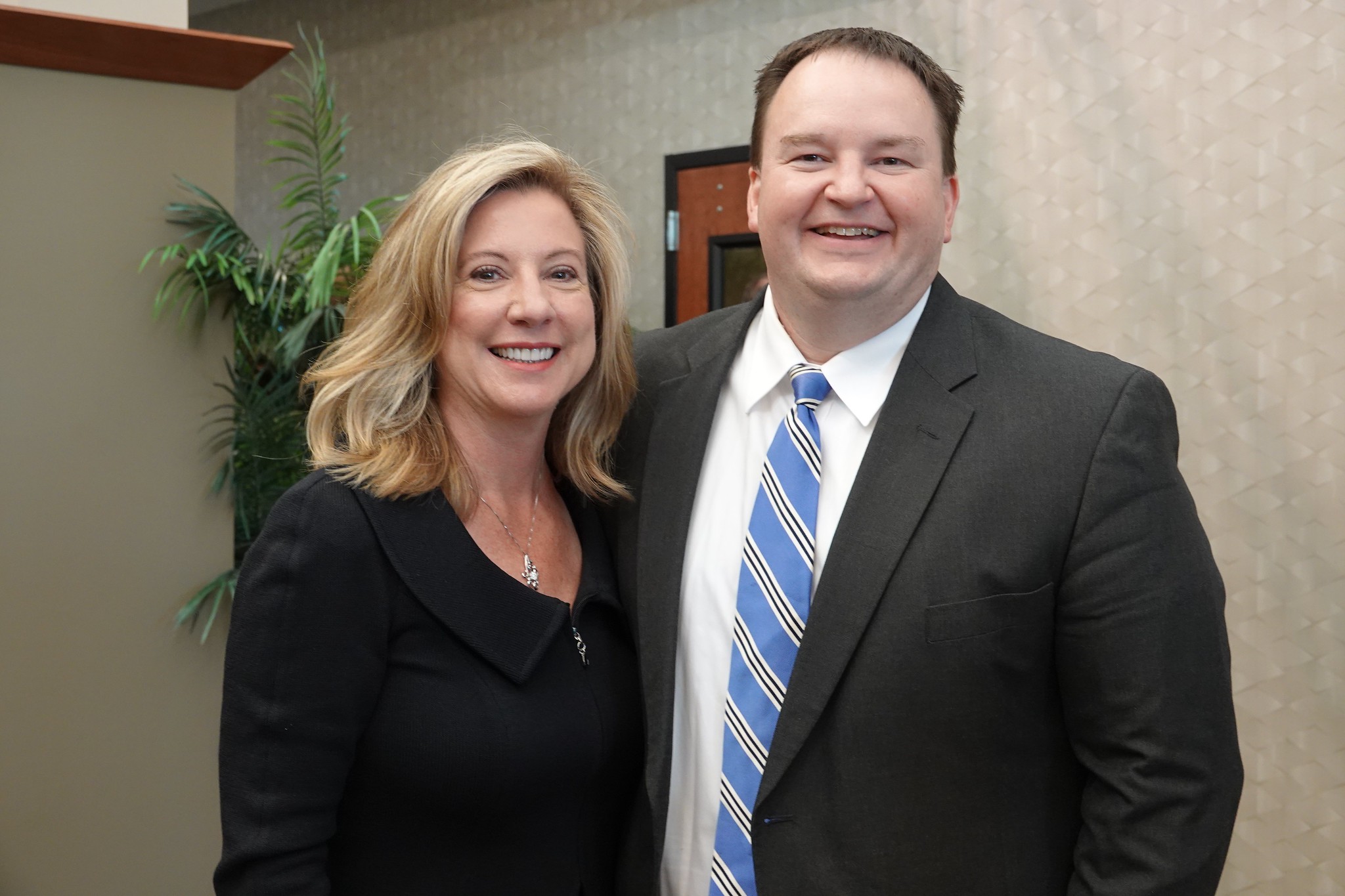Alabama School of Cyber Technology and Engineering picks up speed with new developments, much support
In one year, our state’s third magnet school will open to its first students. Classes will be held in facilities on the University of Alabama in Huntsville (UAH) campus while the school’s permanent location is constructed.
This was one of the significant announcements made on June 28, as the pieces really started to fall into place for the Alabama School of Cyber Technology and Engineering (ASCTE). Other important developments announced that day included a land gift from the City of Huntsville, the school’s first president, and a major donation from the business community.
“Recently, several of our national leaders commented on the fact that they could not find another place in the nation organized enough to create a cyber and engineering statewide magnet school and coordinate potential partnerships between federal, state, local, academia, and industry, like we have done here,” said Alicia Ryan, president of the ASCTE Foundation. “Today we are announcing definitive steps in the future of this statewide magnet school, designed to prepare eager students and develop the next generation workforce in high-growth cyber and engineering disciplines, to continue and amplify the professional development for teachers across the state who are absolutely critical to preparing students to enter these industries. This school will be a game-changer for our state and the nation, and all from right here in the Rocket City.”
“The best thing, this school is for all of Alabama – for Alabama to lead the way in our nation,” Ryan added. “For Alabama to be the shining star in the United States.”
Redstone Federal Credit Union President and CEO Joe Newberry announced a $3,000,000 donation to the school’s foundation, to support the construction and establishment of the School. “Education is a wonderful mechanism for bringing positive change to a community,” Newberry said. “This gift to the Alabama School of Cyber Technology and Engineering Foundation provides another opportunity for us to give back to our thriving communities. The benefits realized will continue for generations to come.”
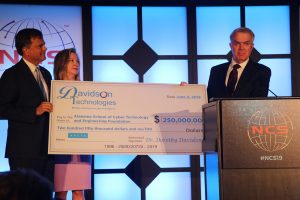
Dr. Joe Green, right, presenting Davidson Technologies’ $250,000 donation to ASCTE to Alicia Ryan and Senator Arthur Orr. [June 6, 2019]
Students will begin instruction at UAH’s Bevill Center, which has residential spaces, as well as classrooms and a cafeteria. The school will serve students from all over Alabama, some of whom will live at the school.
“The University of Alabama in Huntsville is excited to be the interim location for the Alabama School of Cyber Technology and Engineering,” said Dr. Darren Dawson, UAH’s new president. “Our Bevill Center on campus will provide secure living arrangements for students, in addition to classroom space and food services. We appreciate the U.S. Army Corps of Engineers working with us to meet their training needs elsewhere on campus so that the School could begin residency and education on our campus next year.”
The City is working to acquire a parcel of land in Cummings Research Park for the school’s permanent location. The land will be donated to the School’s Foundation for the purpose of constructing and operating the school, and the permanent location is expected to be open in August 2022.
“The City of Huntsville is proud to be an ongoing partner in this cyber initiative by supporting Alabama’s cyber magnet school with a gift of property for a new campus,” said Huntsville Mayor Tommy Battle. “Once again, Huntsville will continue to be the epicenter for the state’s best and brightest to help Alabama and our nation meet the demand for a future workforce in cyber and engineering.”
Local business leaders, education partners, and news reporters attend the announcement on June 28 at Redstone Federal Credit Union on Wynn Drive. Click HERE for more photos from the event.
School’s First President
Matt Massey has served as superintendent of Madison County Schools for the past four and a half years, and was named the magnet school’s first president.
“It’s not only an exciting opportunity to be named president of the school, but to be a resource for teachers and administrators to implement cyber and STEM into their schools,” said Massey. “The result will not just impact 300 students in the school but will exponentially reach students and educators all across the state.”
The school will assist a broad range of teachers, administrators, and superintendents across the State of Alabama in replicating cyber technology and engineering studies in their own schools. Local companies have shared that they need to hire more employees who have skilled training in these fields, and the school will train our nation’s future cyber workforce.
“These are exciting milestones for the future of education in Alabama and for young people across the state who dream of next-generation careers,” Governor Kay Ivey said. “The Alabama School of Cyber Technology and Engineering will be a unique institution, preparing students all across the state with the skills they need for jobs that will be in high demand.”
“The ASCTE Board could not be more pleased with the continued and expanded partnership with UAH, and the tremendous gift by the City of Huntsville through Mayor Battle and the City Council to establish a permanent site in CRP for the school,” said State Senator Arthur Orr, president of the ASCTE’s Board of Trustees. “Along with that, the equally significant support from the private sector with the pacesetting donation from Redstone Federal Credit Union will go toward construction of the school on our new site. All in all, it is gratifying to see the Huntsville community, and in particular Redstone Federal, realize the importance of this school to the area and state as we establish a world-class institution.”
Cyber’s Evolution in Huntsville
The new magnet school is an idea born through a confluence of ideas and partners, including Cyber Huntsville, Senator Orr, the Huntsville/Madison County Chamber and Governor Ivey. Huntsville Mayor Tommy Battle announced the Cyber Huntsville initiative in 2010 to help stimulate the growth of the Cyber sector in the region and to help meet the need for cyber professionals, research, and growth in this field.
Cyber Huntsville is a 501(c)(6) nonprofit organization made up of industry, government, and academic institutions dedicated to making Huntsville and the Tennessee Valley region recognized nationally, and internationally, in the field of cyber. Its work has already led to the National Cyber Summit, an annual event held in Huntsville that now attracts thousands of cyber security professionals and agencies.
Huntsville’s support for cyber education got a jump start several years ago with the Cyber-Patriot program, which provides students with a challenging, competitive environment to help them develop skills and knowledge about cyber fields and how these apply to national security interests and personal online security. Schools in our area have excelled in these areas, winning national championships and acclaim. Two Rhodes Scholars have emerged from these local programs as well.
U.S. Cyber Camp
Another Cyber catalyst is the U.S. Cyber Camp, the newest STEM camp at the U.S. Space & Rocket Center (USSRC). In 2017, Governor Ivey announced $10 million in funding support to help establish the program, and help the USSRC expand its campus. The USSRC worked with Cyber Huntsville and UAH to develop programming for the camp, and has hosted about six camp sessions so far.
“We have fantastic industry support from Cyber Huntsville and UAH. They built out our curriculum, and we’re putting our knowledge base on it, which is how to make it immersive and fun,” said Kay Taylor, Ph.D., Director of Education at the U.S. Space & Rocket Center. Taylor adds that industry professionals come in and lead discussions with students, answering questions about what path they took to work in the cyber field, and what they do on the job.
“We’re trying to dispel the idea that cyber involves individuals in black-hooded sweatshirts in basements, hacking systems,” said Taylor. “Every business today has a cyber interest. Cyber is about protecting the customer, it’s about protecting the economic security of a business. It’s a form of national security. We want to give a broader vision than what you might see in popular media, or popular culture.”
During the five-day camp, students learn about a variety of cyber topics. These include how networks are created, how data is transacted, firewalls, programming, operating systems, and encryption. There are also discussions about ethics.
“We spend a lot of time explaining that a great deal of cyber focuses on the individual. We talk about the importance of ethical behavior with cyber technology,” explained Taylor. “This is a responsibility for them, with great opportunity. We talk about ways people can exploit information structures to benefit themselves. We talk about ways to shore up and protect information. It’s not an exaggeration to say we’re in the midst of global cyber warfare right now. We encourage them to use their power for good.”
The USSRC currently plans Cyber Camp around school schedules, incorporating sessions during fall, spring and summer breaks for students. Taylor said initially, as they beta-tested the program, they provided tuition stipends to students from Alabama. They have continued to refine it with each session, and as word spreads about the camp, students from other states are purchasing slots.
Cyber Camp currently serves high school students ages 15 to 18, but Taylor says they are looking to add in younger ages, because many of the concepts, such as responsibility and ethics, can be introduced at the middle school level.
“It fits perfectly with where we are for information technology,” said Taylor. “What we would ideally like, for our middle school students who are from Alabama, is to identify talent who could go to the new high school. The high school will be a tremendous addition – there will be such a synergy between the IT community and our magnet school. Everyone is looking for talent, and in Alabama, we know we have smart students. This is going to be a great addition.”
Contributed by Claire Aiello, Vice President, Marketing & Communications
This article is published in the August 2019 issue of Initiatives magazine.



